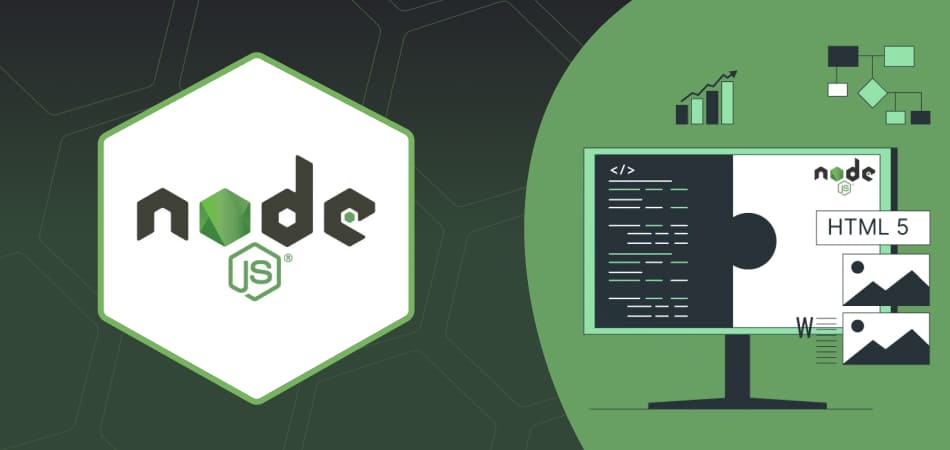In the ever-evolving landscape of web and software development, choosing the right technology stack is crucial for the success of any project. Node.js, a powerful and versatile JavaScript runtime, has gained significant popularity for its ability to handle a wide range of applications. But is Node.js the right choice for your project? This article explores the features, advantages, and potential drawbacks of Node.js to help you make an informed decision.
What is Node.js?
The cross-platform, open-source Node.js JavaScript runtime environment allows JavaScript code to be executed outside of a web browser. It allows developers to use JavaScript to write server-side code, enabling the creation of dynamic and scalable network applications.
Key Features of Node.js:
- Asynchronous and Event-Driven: Node.js operates on a non-blocking, event-driven architecture, making it highly efficient for handling concurrent connections.
- Single Programming Language: Developers can use JavaScript for both client-side and server-side development, ensuring consistency and reducing context switching.
- Rich Ecosystem: Node.js has a vast ecosystem of libraries and modules available through the Node Package Manager (NPM), facilitating rapid development.
- Scalability: Node.js is designed to build scalable network applications, capable of handling a large number of simultaneous connections with high throughput.
- Cross-Platform Compatibility: Node.js applications can run on various operating systems, including Windows, Linux, and macOS.
Node.js: The Powerhouse of JavaScript
Node.js has transformed JavaScript from a language primarily used for client-side scripting into a powerful tool for building robust server-side applications. Here’s why Node.js is considered a powerhouse in the world of JavaScript:
- High Performance: Node.js uses the V8 JavaScript engine developed by Google, which compiles JavaScript directly to machine code, resulting in fast execution.
- Real-Time Capabilities: Its event-driven architecture makes Node.js ideal for building real-time applications such as chat applications, online gaming, and collaborative tools.
- Microservices Architecture: Node.js is well-suited for microservices architecture, enabling the development of modular, loosely-coupled services that can be deployed independently.
- API Development: Node.js excels in building APIs, making it a preferred choice for creating backend services that interact with front-end applications.
- Active Community: The Node.js community is vibrant and active, continuously contributing to its growth and improvement, ensuring access to the latest tools and best practices.
Full-Stack Development with Node.js: Unifying the Development Landscape
One of the significant advantages of Node.js is its ability to unify the development landscape by enabling full-stack JavaScript development. This unification offers several benefits:
- Consistent Development Experience: Using JavaScript for both front-end and back-end development provides a seamless and consistent development experience.
- Reduced Learning Curve: Developers only need to master one language, reducing the learning curve and increasing productivity.
- Code Reusability: Sharing code between the client and server sides becomes more straightforward, promoting code reuse and reducing duplication.
- Simplified Collaboration: Full-stack JavaScript development fosters better collaboration between front-end and back-end developers, leading to faster development cycles.
- Unified Tooling and Libraries: Developers can use the same tools, libraries, and frameworks across the entire stack, streamlining development processes.
Key Advantages of Choosing Node.js Development Services
Node.js offers numerous advantages that make it an attractive choice for web and software development projects. Here are some key benefits:
- Fast and Scalable: Node.js is designed for building fast and scalable network applications, capable of handling numerous simultaneous connections with minimal overhead.
- Efficient Development: Its asynchronous, non-blocking nature allows developers to create high-performance applications with efficient resource utilization.
- Rich Ecosystem: The extensive NPM ecosystem provides a wide range of libraries and modules, accelerating development and reducing the need to build from scratch.
- Cross-Platform: Node.js applications can run on multiple platforms, offering flexibility and reducing deployment complexities.
- Real-Time Applications: Node.js excels in building real-time applications, such as chat apps, online gaming, and live streaming services.
- Strong Community Support: The active Node.js community ensures continuous improvement, access to the latest tools, and a wealth of resources for developers.
- Microservices-Friendly: Node.js is well-suited for microservices architecture, enabling the development of modular and scalable services.
Understanding the Potential Drawbacks of Node.js
While Node.js offers numerous advantages, it’s essential to be aware of its potential drawbacks:
- Single-Threaded Architecture: Node.js operates on a single-threaded event loop, which can lead to performance bottlenecks for CPU-intensive tasks.
- Callback Hell: The asynchronous nature of Node.js can lead to complex and hard-to-maintain code, known as callback hell. Async/await and Promises can be used to lessen this problem.
- Maturity of Libraries: While the NPM ecosystem is vast, not all libraries are mature or well-maintained, requiring careful selection and evaluation.
- Scalability Challenges: While Node.js is designed for scalability, managing horizontal scaling and load balancing can be complex in large-scale applications.
- Limited Multithreading: Node.js has limited support for multithreading, which can be a constraint for applications requiring heavy parallel processing.
When to Choose or Not to Choose Node.js
Here’s a tabular representation to help you determine when Node.js is the right choice for your project:
| When to Choose Node.js | When Not to Choose Node.js |
| Real-time applications (e.g., chat apps, online gaming) | CPU-intensive applications (e.g., heavy data processing) |
| API development and microservices | Applications requiring robust multithreading |
| Applications requiring high concurrency and scalability | Projects relying on mature libraries not available in NPM |
| Single-page applications (SPAs) | Large-scale enterprise applications with complex workflows |
| Streaming applications (e.g., video streaming) | Applications with strict relational database requirements |
| Full-stack JavaScript development | Projects needing extensive computational tasks |
Making the Right Choice: When is Node.js the Perfect Fit?
Node.js is the perfect fit for projects that require high concurrency, real-time capabilities, and efficient handling of I/O-bound tasks. It excels in scenarios where rapid development, scalability, and seamless integration with front-end technologies are critical. The following are some excellent Node.js use cases:
- Real-Time Applications: Node.js is well-suited for real-time applications such as chat applications, online gaming, and live streaming services.
- Microservices Architecture: Its modular nature makes Node.js ideal for building microservices, enabling scalable and maintainable applications.
- API Development: Node.js is a popular choice for developing RESTful APIs, providing a lightweight and efficient solution for backend services.
- Single-Page Applications (SPAs): Node.js seamlessly integrates with front-end frameworks like React and Angular, making it a great choice for SPAs.
- Streaming Applications: Node.js is designed for handling streaming data, making it ideal for applications like video streaming and file uploads.
Partnering with the Right Node.js Development Services Provider
Choosing the right Node.js development services provider is crucial for the success of your project. Here’s what to consider:
- Experience and Expertise: Look for a provider with a proven track record in Node.js development and experience with projects similar to yours.
- Technical Proficiency: Ensure the provider has expertise in the latest Node.js technologies, frameworks, and best practices.
- Client Testimonials and Reviews: Examine customer feedback and reviews to determine the standing and dependability of the supplier.
- Communication and Collaboration: Collaboration and communication: These two processes must be carried out effectively.
- Project Management: Assess their project management methodologies and ability to deliver projects on time and within budget.
- Post-Development Support: Ensure the provider offers post-development support and maintenance services to address any issues and ensure long-term success.
- Cost and Value: Consider the cost of services in relation to the value they provide. Opt for a provider that offers a good balance of cost-effectiveness and quality.
Conclusion: Node.js: A Powerful Tool for Building Modern Applications
Node.js has established itself as a powerful and versatile tool for building modern applications. Its high performance, scalability, and ability to unify front-end and back-end development make it an attractive choice for a wide range of projects. However, it’s essential to understand its strengths and potential drawbacks to determine if it’s the right fit for your specific needs.
By leveraging the power of Node.js and partnering with the right development services provider, you can build robust, scalable, and efficient applications that meet the demands of today’s dynamic digital landscape. Whether you’re developing real-time applications, APIs, or microservices, Node.js offers the tools and capabilities to bring your vision to life and achieve your business goals.



